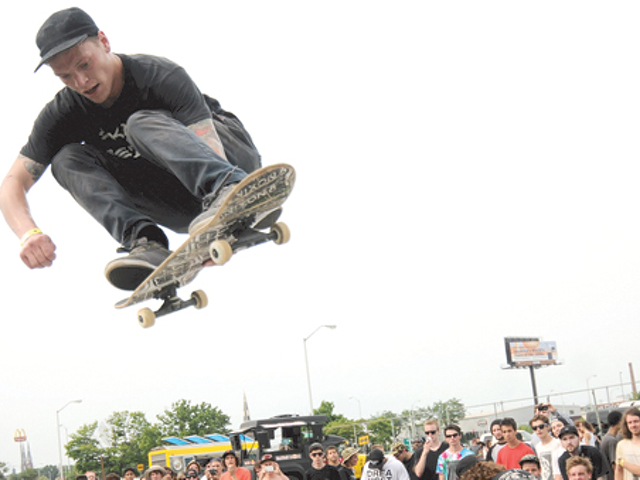Boyhood | A
"You are responsible for your own actions," declares a sign hanging inside the first grade class Mason Jr., the “boy” of the title, attends. Seems like a common sense warning, right? The kind of aphorism that tidily defines our role in society. Yet, by chronicling one boy's life, from age 6 to 18, Richard Linklater's miraculously intimate Boyhood makes it abundantly clear that life is as much about moments seizing us as it is about us seizing moments.
Boyhood's much ballyhooed conceit — returning each year to shoot the same principal cast over twelve years — is undoubtedly ballsy, but what stands out is how poignantly and convincingly it captures the totality of growing into the person you become. Linklater (with writing assists from his cast) sculpts drama out of time, demonstrating that the fleeting moments we experience day in and day out are actually telling the story of our lives.
In other words, everyday life isn't heightened by drama. Everyday life is drama. And as we watch Mason (Ellar Coltrane) grow up, it becomes clear that life isn't necessarily “about” anything, that who we become is the sum total of who we were and are. This applies to Samantha, Mason's older sister (played by the director’s own daughter, Lorelei Linklater) as well as Mason Sr. (Ethan Hawke) and Olivia (Patricia Arquette), his divorced parents.
There are no big, melodramatic confrontations, superficial villains or corny feel-good moments. The individual scenes in Boyhood -captured by Linklater's typically inelegant camera work- aren't there to represent defining moments. They are parts of a whole, weaving together the cumulative experiences of childhood, adulthood and parenthood into one inseparably defining story.
Yeah, it's a philisophical point, and one that only arrives after you've left the theater and ruminated on Boyhood'sdeceptively real world scenarios. Linklater's generously observant and deeply humane cinematic collage is uncanny in its ability to draw you in and make you you feel as if you have lived life alongside Mason. And like his parents, when he reaches adulthood you'll wonder where the time has gone.
But what makes Boyhood all the more remarkable is the sly double entendre of its title (which it shares with Leo Tolstoy's similarly themed second novel). Linklater's portrait of time and maturation applies equally to the grownups that surround Mason. Mason Sr. and Olivia spend the same dozen years trying to navigate the ever vexing obligations of adulthood and parenthood. Sometimes they disappoint. Sometimes they regret their choices. But both are given the room to outlive their mistakes and become fuller human beings.
While it's a shame Linklater doesn't fully commit to a socio-economic and cultural critique of Mason's situation, Arquette’s character is the most nuanced depiction of single motherhood I've seen in a long time. Moving from town to town, job to job, and man to man, she simultaneously resents and embraces the job of raising children she had too young and a life that never seems to fully belong to her. Arquette beautifully conveys Olivia's warring impulses and Linklater honors her with one of the most moving moments in the film, a confession filled with anger, frustration, and pride but, ultimately, unconditional love. Hopefully it'll be remembered come Oscar time.
As for Hawke, his manager should only allow him to make movies with Linklater. Where he is mostly passable in other Hollywood projects, his artistic collaborations with the indie director clearly bring out the best in him. From a cameo appearance in Fast Food Nation to the immature-yet-evolving Jesse in the Before trilogy (Sunrise, Sunset,Midnight), his likably flawed characters have a way of defying stereotype. The same is holds true here. Mason Sr. may be a deadbeat dad, but he knows it and tries to do better.
None of it would work, of course, without the risk Linklater took in casting the wide-eyed Ellar Coltrane. Getting a 6-year-old to commit to a 12-year process is one thing; knowing that that boy will mature into a thoughtful young actor is quite another. Over the course of three seamless hours, Mason develops from an observant, uncarved block into a restless young man uncertain of what he wants but with a pretty good idea of what he doesn't. Like all of Linklater's character creations, he is wonderfully alert and full of questions. For adults looking back on their own life, it probably seems like he is ending one phase of his life and embarking on another. But as Boyhood gently and gracefully reminds us, we are all in a constant state of growing up.
Boyhood is playing at the Main Art in Royal Oak. It is rated R and has a run time of 2 hours 44 minutes.





